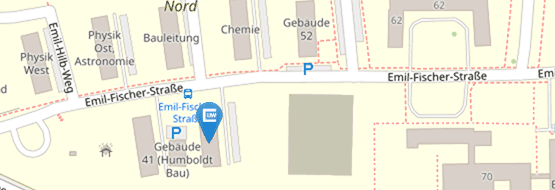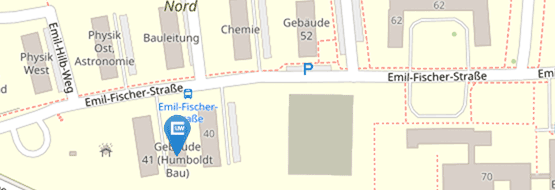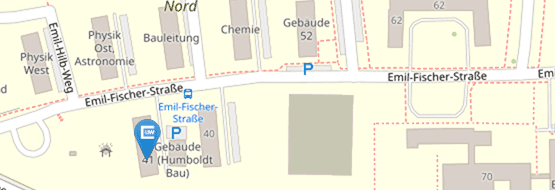Qualification targets Master Mathematics (120 ECTS)
Scientific qualification
| Qualification target | Implementation | Target achievement |
|---|---|---|
| Graduates are trained in analytical thinking, possess a strongly developed capacity for abstraction, universally applicable problem-solving skills and the ability to structure complex contexts. | Lectures with exercises, seminars, working groups, thesis | Exercises, written examinations, individual oral examinations, presentations, thesis |
| Graduates are able to independently familiarise themselves with current research areas in mathematics with the help of specialist literature. | Seminars, working groups, thesis | Presentations, thesis |
| Graduates are able to present their knowledge, ideas and problem solutions on complex issues to a professional audience in a comprehensible way. | Seminars, working groups, exercises | Presentations, presentation of the solution of exercises |
| Graduates possess the subject knowledge, ways of thinking and working, and methodological skills required for independent academic work, especially for doctoral studies. | Seminars, working groups, lectures, exercises, thesis | Presentations, exercises, examinations, individual oral examinations, thesis |
| Graduates know the rules of good scientific practice and are able to observe them in extensive work. | Thesis | Thesis |
| Graduates possess advanced knowledge of current areas of mathematics and can confidently handle advanced methods of these areas. | Seminars, working groups, lectures, exercises | Presentations, exercises, examinations, individual oral examinations |
| Graduates possess in-depth knowledge and overview of current research in at least one sub-field of mathematics. | Working groups and seminars, thesis | Presentations, thesis |
| Graduates know current areas and modern methods of other subjects in which mathematical methods are used. | optional application subject (biology, chemistry, computer science, aerospace informatics and/or physics) | Depending on the subject: examinations, practicals, project work, seminar presentations and working groups, assignments, oral examinations |
Ability to take up employment
| Qualification target | Implementation | Target achievement |
|---|---|---|
| Graduates are trained in analytical thinking, possess a strongly developed capacity for abstraction, universally applicable problem-solving skills and the ability to structure complex contexts. | Lectures with exercises, seminars, working groups, thesis | Exercises, written examinations, individual oral examinations, presentations, thesis |
| Graduates are able to formulate and present their knowledge, ideas and problem solutions in a target group-oriented and comprehensible way. | Seminars, exercises, learning by teaching | Presentations, presentation of the solution of exercises, supervision of an exercise group under guidance |
| Graduates are able to recognise, structure and model complex problems from other fields, develop solutions using mathematical methods and interpret and evaluate these results. | Optional applied subject, seminars, working groups, lectures and exercises from the field of applied mathematics, thesis | Exercises, exercises, thesis |
| Graduates have a strong perseverance in solving complex problems. | Exercises, thesis | Exercises, thesis |
| Graduates are able to work constructively and goal-oriented in teams and to bear responsibility in doing so. | Seminars, working groups, learning by teaching | Presentations, supervision of exercise groups and tutorials |
| Graduates are able to access new fields of knowledge and current developments independently, efficiently and systematically. | Seminars, working groups, thesis | Presentations, thesis |
| Graduates possess the ability to responsibly help shape projects in interdisciplinary teams in the field of computer science, natural sciences and engineering. | optional application subject and application practical | Practicals, project work, presentations |
Personality development
| Qualification target | Implementation | Target achievement |
|---|---|---|
| Graduates are trained in analytical thinking, possess a strongly developed capacity for abstraction, universally applicable problem-solving skills and the ability to structure complex contexts. | Lectures with exercises, seminars, working groups, thesis | Exercises, written examinations, individual oral examinations, presentations, thesis |
| Graduates are able to participate in participatory processes. | Involvement in the student council and other student structures, participation in commissions and committees | Committee work and meetings |
| Graduates have a strong perseverance in solving complex problems. | Exercises, thesis | Exercises, thesis |
| Graduates are able to formulate complex ideas and proposed solutions in a generally understandable way and to present them professionally. | Seminars, working groups, exercises, learning by teaching | Presentations, presentation of solutions to exercises, supervision of exercise groups and tutorials |





